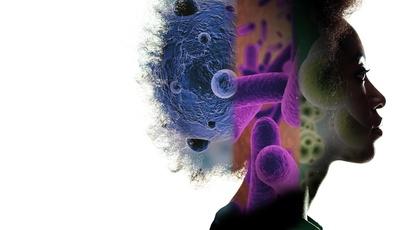
NOVA
What Caused the Dinosaurs to Go Extinct?
Show title: NOVA
Video title: What Caused the Dinosaurs to Go Extinct?
Video duration: 1m 50sVideo description: The asteroid released the equivalent of 10-billion nuclear bombs worth of energy when it struck Earth. The impact started a chain of events that wiped out 75% of all plants and animals at the time.

Can We Make Life? Preview
"It's alive!" Since Dr. Frankenstein spoke those famous words, we've been alternately enthralled and terrified by the idea of creating life in the lab. Now, a revolution in genetic engineering and thrilling innovations in synthetic biology are bringing that dream—or nightmare, as the case may be—closer to reality. New tools allow researchers to use cells to create their own DNA.

How does CRISPR work?
CRISPR makes gene editing faster, cheaper, and easier than ever before. Here's how.

Bringing Back Woolly Mammoths

Can Gene Therapy Cure Cancer?
CAR-T Gene Therapy is a new treatment for some forms of Leukemia and Non-Hodgkin Lymphoma.

What's the Universe Made Of? Preview
The universe is hiding something. In fact, it is hiding a lot. Everything we experience on Earth, the stars and galaxies we see in the cosmos—all the “normal” matter and energy that we understand—make up only 5% of the known universe. Find out how scientists are discovering new secrets about the history of the universe, and why they’re predicting a shocking future.

What is a Neural Net?
Neural nets have revolutionized the AI industry for years. But what exactly are they?

Can Cat Poop Make You Crazy?

Can We Build a Brain? Preview
Artificially intelligent machines are taking over. They’re influencing our everyday lives in profound and often invisible ways. They can read handwriting, interpret emotions, play games, and even act as personal assistants. They are in our phones, our cars, our doctors’ offices, our banks, our web searches…the list goes on and is rapidly growing ever longer.

Are We Alone? Preview
The search for extraterrestrial life is an age-old quest. But recent breakthroughs make today an era unlike any in the history of astronomy. From the exhilarating probing of our own solar system and the Kepler mission’s astounding discovery of thousands of extrasolar planets, to the next-generation telescopes under development, the prospects for finding life beyond Earth have never been stronger.

The Mystery of Tabby’s Star
Tabby’s star flickers erratically and no one knows why—could it be an alien megastructure?

The Secrets of Spider Seduction
Can scientists stomach hours of spider sex in order to understand their language?

What's Living in You? Preview
Whether they make you fat, fart, or freak out, microbes play a central role in your life. Right beneath your nose—on your face, in your gut, and everywhere in between—trillions of bacteria, viruses, and fungi are so abundant in your body, they outnumber your human cells. But these aren’t just nasty hitch-hikers. Many are crucial to your survival.

Profile: Jack Gilbert
Jack Gilbert studies the effects of the microbiome on the human body and mind.

Can We Use Pollution to Find Aliens?
The hunt for pollution in other planets’ atmospheres may determine whether or not we are alone in the universe.

Profile: Jason Kalirai
Astrophysicist Jason Kalirai observes stars and searches for habitable planets in the hopes of finding life.

What are Animals Saying? Preview
From singing whales and squeaking bats to thumping spiders and clicking dolphins, the world is filled with the exotic sounds of our fellow creatures. What are they saying? Can we decode their own communications? NOVA Wonders follows researchers around the globe who are deciphering an amazing array of clues that reveal how animals share information critical to their survival.













